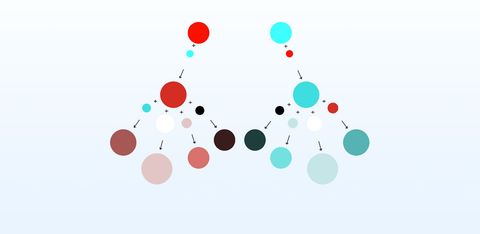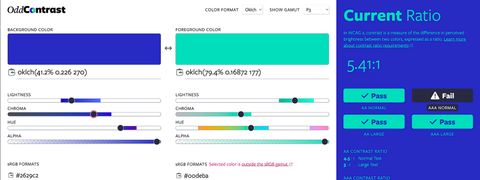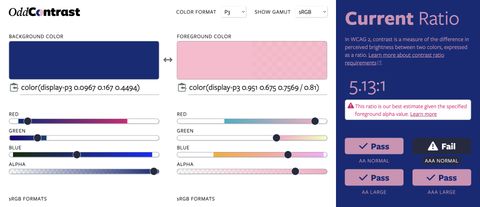Make the Web a More Colorful Place!
A guide to using new color spaces & formats with OddContrast
OddBird’s color tool not only checks contrast ratios, but supports the new CSS color formats and spaces.

from Natalya Shelburne
If you write code and you want to delve into design, Natalya Shelburne’s Practical Color Theory for Coders will get you up and running with a beautiful, cohesive, and accessible color palette using Sass color functions, and teach you why her palettes work so well, all at the same time.
So you write code, but design intrigues you and you’d like to delve deeper. Where to start? The sheer number of tools and tutorials is overwhelming. Later this week, I’ll be publishing an article with my recommendations for how to get started, but while you’re waiting, check out Natalya Shelburne’s [Practical Color Theory for People WhoCode][].
Natalya is a fine artist, speaker, and front-end developer. Her Sass color functions make it easy to create beautiful color palettes. Start with any HSL color – for example, your client’s primary brand color. Use Natalya’s color functions to find a complimentary color. Mix and lighten your primary and secondary colors to create neutral colors. Darken and lighten these colors even further to create black and white. Voila! You’re designing with color.
In the physical world, colors that appear next to one another experience similar lighting conditions: the bright light of morning or the dim yellow glow of a desk lamp. Using Natalya’s color functions, you can mix your primary and secondary colors to establish the same type of color relationship on the web. Check out Natalya’s demo for detailed instructions. If you’re that person who’s always asking why, she’s even provided a special toggle for you!
Have some color theories of your own? Let’s discuss. Send us a message via Twitter.

A guide to using new color spaces & formats with OddContrast
OddBird’s color tool not only checks contrast ratios, but supports the new CSS color formats and spaces.

hint popovers, position-area and more
We have been busy updating the Popover and CSS Anchor Positioning Polyfills, but there is still more we can do with your help.

Display color gamut ranges and more
OddContrast, OddBird’s color format converter and contrast checker, gets new features – including the ability to swap background and foreground colors, and display color gamut ranges on the color sliders. Contrast ratios now incorporate foreground color alpha values.